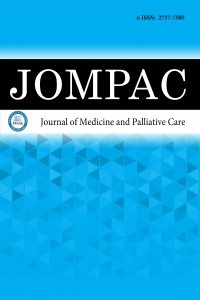1. Peykerli G. Ölümcül hastalıklara psikolojik yaklaşım. Cumhuriyet Üniversitesi Tıp Fakültesi Derg 2003; 25: 62-65.
2. Van der Geest S. Dyingpeacefully: Considering good death and bad death in Kwahu-Tafo, Ghana. Soc Sci Med 2004; 58: 899–11.
3. Y ao CA, Hu WY , Lai YF , Cheng SY , Chen CY , Chiu TY . Does dying at home influence the good death of terminal cancer patients? J Pain Symptom Manage 2007; 2: 3-6.
4. Debate of the age. The Millenium Papers, The Future of Health and Care of Older People: The Best is Yetto Come, Age Concern Published, London, England 1999; 41-46.
5. Beuks B, Nijhof AC, Meertens JH, Ligtenberg J, T ulleken J, Zijistra J. A good death. Intensive Care Med 2006; 32: 752-3.
6. W asserman LS. Respectfuldeath: a model for end-of-life care. Clin J Oncol Nurs 2008; 12: 621-6.
7. Duyan V . Saygın ölüm ilkelerine ilişkin tutumları değerlendirme ölçeği’nin geçerlik ve güvenirlik çalışması. Turk J Fam Med Primary Care 2014; 8: 25-31.
8. Schwartz CE, Mazor K, Rogers J, Yunsheng MA, Reed G. Validation of a new measure of concept of a good death. J Palliat Med 2003; 6: 4-7.
9. Fadıloğlu Ç, Aksu T. İyi ölüm ölçeğinin geçerlilik ve güvenirliği. Ege Üniversitesi Hemşirelik Fakültesi Derg 2013; 29: 1-15.
10. Köse S, İnal Tunalı B , Yıldırım G. Yoğun bakımda çalışan hekim ve hemşirelerin ölüm ve saygın ölüm ilkelerine ilişkin tutumları. YBHD 2019; 23: 9-17.
11. Çelik N. Yoğun bakım hemşirelerinin ölüme ve saygın ölüm ilkelerine ilişkin tutumları. Mersin Univ Saglık Bilim Derg 2019; 12: 316-27.
12. Dağ A, Badır A. Hekim ve hemşirelerin bazı özelliklerinin saygın ölüm ilkelerine ilişkin tutumlar üzerine etkisi. DEUHFED 2017; 10: 186-92.
13. Iranmanesh S, Dargahi H, Abbaszadeh A. Attitudes of Iranian nurses toward caring for dying patients. Palliat Support Care 2008; 6: 363–9.
14. Dilan Ö. Kanser hastaları, yakınları ve hemşirelerin ölüme ve iyi ölüme ilişkin görüşleri. Başkent Üniversitesi Sağlık Bilimleri Enstitüsü Hemşirelik Tezli Yüksek Lisans Programı 2019.
15. Koku F, Ateş M. Terminal dönem hasta bakımının niteliğini geliştirmede hemşirelerin ölüme ilişkin deneyim ve tutumları. Sağlık ve Hemşirelik Y önetimi Derg 2016; 3: 99-104.
16. Şahin M, Demirkıran F, Adnan F. Pursing students death anxiety, influencing factors and request of caring for dying people. J Psychiatr Nurs 2016; 7: 135–41.

